| Srl | Item |
| 1 |
ID:
074946
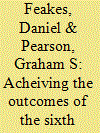

|
|
|
| 2 |
ID:
074947


|
|
|
| 3 |
ID:
059734
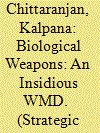

|
|
|
| 4 |
ID:
142653
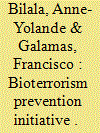

|
|
|
|
|
| Summary/Abstract |
The threat of terrorist use of weapons of mass destruction remains a daunting concern. Governments have undertaken several initiatives at the national and international level to prevent such illicit use, yet challenges remain. Notable is the absence of a single collaborative international forum of experts dedicated solely to bioterrorism prevention. The establishment of a Bioterrorism Prevention Initiative could be a possible solution to address this gap. This article explores possibilities for such an initiative and the ways in which it could strengthen the existing bio-nonproliferation regime.
|
|
|
|
|
|
|
|
|
|
|
|
|
|
|
|
| 5 |
ID:
020682
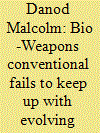

|
|
|
|
|
| Publication |
Feb 2002.
|
| Description |
30-32
|
|
|
|
|
|
|
|
|
|
|
|
|
|
|
|
| 6 |
ID:
018101
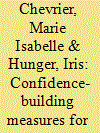

|
|
|
|
|
| Publication |
Fall-Winter 2000.
|
| Description |
24-42
|
|
|
|
|
|
|
|
|
|
|
|
|
|
|
|
| 7 |
ID:
074945
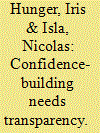

|
|
|
| 8 |
ID:
020930
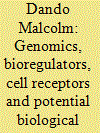

|
|
|
|
|
| Publication |
Dec 2001.
|
| Description |
239-257
|
|
|
|
|
|
|
|
|
|
|
|
|
|
|
|
| 9 |
ID:
142652
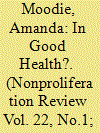

|
|
|
|
|
| Summary/Abstract |
Since the 1990s, the group of stakeholders working to combat biological weapons (BW) proliferation has broadened to include new actors who have not traditionally focused on security issues, including organizations from the public health sector, researchers in the life sciences, and the biosafety community. This has had significant benefits for the Biological and Toxin Weapons Convention (BWC) and the arms control establishment more broadly. However, the BWC's agenda has become increasingly dominated by issues of international health and global health security. By focusing solely on response strategies, the United States and other interested parties risk losing sight of other important elements of a counter-BW strategy, including deterrence and prevention. Focusing on public health-related issues to the exclusion of more traditional security matters puts the nonproliferation regime at risk, because it limits the amount of time that stakeholders have available to grapple with the critical questions facing the BWC and the biological weapons nonproliferation establishment—questions that must be answered if the regime is to survive.
|
|
|
|
|
|
|
|
|
|
|
|
|
|
|
|
| 10 |
ID:
182969
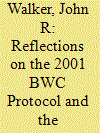

|
|
|
|
|
| Summary/Abstract |
The history of the 1972 Biological and Toxin Weapons Convention (BWC) shows that efforts to make its compliance provisions more effective have invariably fallen short. The high point of these efforts came during the 1995–2001 verification-protocol negotiations in the Ad Hoc Group (AHG). Despite solid preparation by the 1992–93 verification experts’ meetings, the AHG failed to reach agreement on a Protocol. The challenges of devising effective verification measures were then, and remain now, considerable: a combination of complex scientific, technological, diplomatic, and legal obstacles proved insurmountable. Despite the passage of time, some states parties continue to call for the AHG’s resumption, but many of those doing so have forgotten the challenges and that their own positions in the 1990s were instrumental in the AHG’s failure. This does not augur well for future efforts to strengthen the BWC at its Ninth Review Conference.
|
|
|
|
|
|
|
|
|
|
|
|
|
|
|
|
| 11 |
ID:
074944
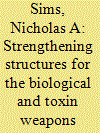

|
|
|
| 12 |
ID:
056984
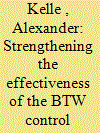

|
|
|
| 13 |
ID:
079626
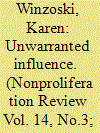

|
|
|
|
|
| Publication |
2007.
|
| Summary/Abstract |
This article examines the effects that the U.S. biotech-pharmaceutical industry has had on U.S. government policy, specifically on the 2001 decision to reject the Biological and Toxin Weapons Convention verification protocol. It concludes that the biotech-pharmaceutical industry's concerns for the protection of trade secrets contributed to the weakening of the proposed inspection regime, particularly through its demands for managed access. This added to doubts among U.S. policymakers regarding the protocol's effectiveness. However, this article cautions against blaming industry for the rejection of the verification protocol, when most of the responsibility lies with government. A poorly handled 1994 visit to a Pfizer facility coordinated by the State Department resulted in increased wariness of international inspections within industry. Furthermore, both the Department of Defense and the Central Intelligence Agency had reasons to object to the proposed regime because it could result in the exposure of their own secret biodefense research. Finally, though the biotech-pharmaceutical industry's lobbying efforts may have led to the rejection of the protocol, it should be expected that any industry will try to minimize regulation. It is the responsibility of government, not industry, to decide the best way to achieve national interests, whether through the enhancement of the biological weapons regime or through the continued support of favored industries. If government chooses poorly, then government ought to be criticized.
|
|
|
|
|
|
|
|
|
|
|
|
|
|
|
|
| 14 |
ID:
058392
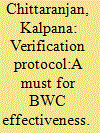

|
|
|